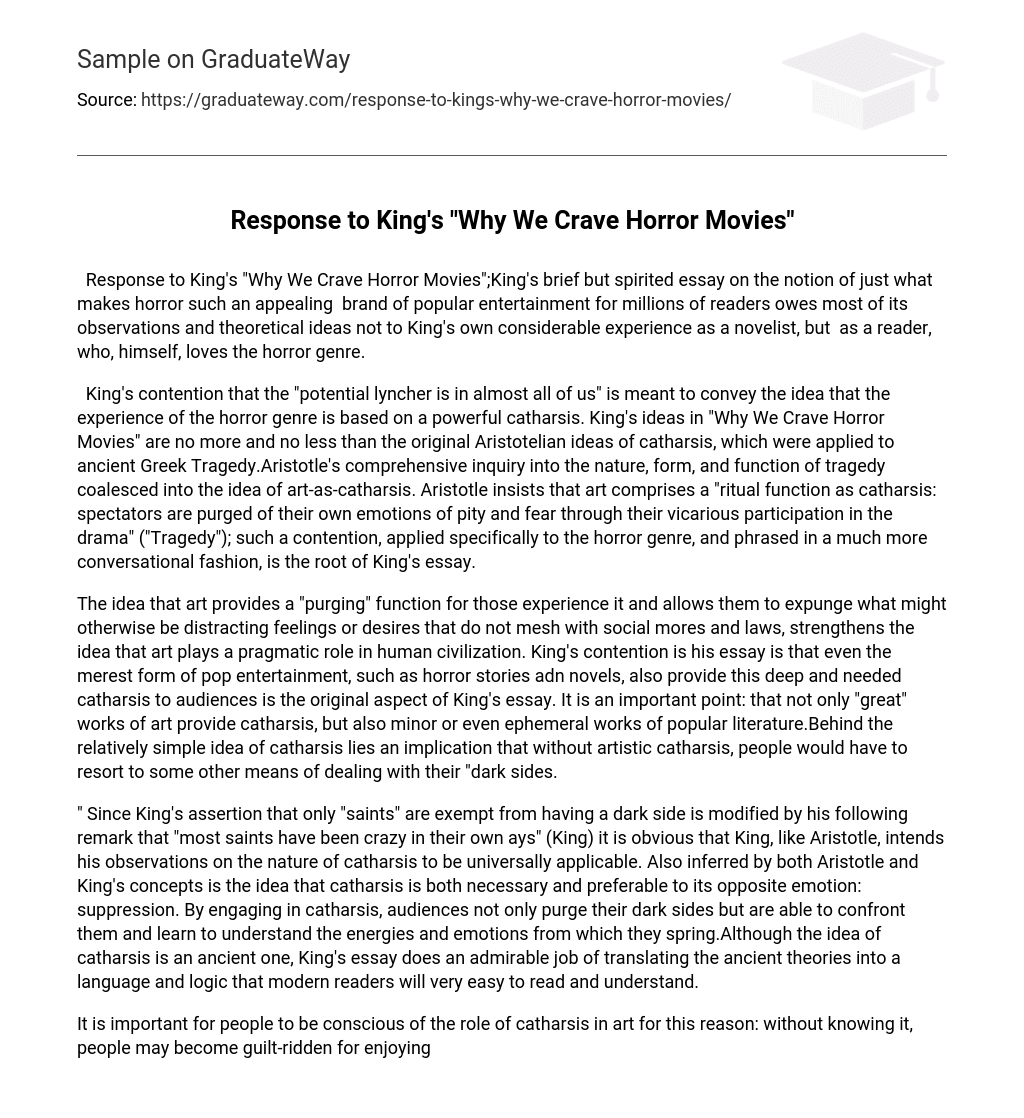King’s brief but spirited essay on the notion of just what makes horror such an appealing brand of popular entertainment for millions of readers owes most of its observations and theoretical ideas not to King’s own considerable experience as a novelist, but as a reader, who, himself, loves the horror genre.
King’s contention that the “potential lyncher is in almost all of us” is meant to convey the idea that the experience of the horror genre is based on a powerful catharsis. King’s ideas in “Why We Crave Horror Movies” are no more and no less than the original Aristotelian ideas of catharsis, which were applied to ancient Greek Tragedy.
Aristotle’s comprehensive inquiry into the nature, form, and function of tragedy coalesced into the idea of art-as-catharsis. Aristotle insists that art comprises a “ritual function as catharsis: spectators are purged of their own emotions of pity and fear through their vicarious participation in the drama” (“Tragedy”); such a contention, applied specifically to the horror genre, and phrased in a much more conversational fashion, is the root of King’s essay.
The idea that art provides a “purging” function for those experience it and allows them to expunge what might otherwise be distracting feelings or desires that do not mesh with social mores and laws, strengthens the idea that art plays a pragmatic role in human civilization. King’s contention is his essay is that even the merest form of pop entertainment, such as horror stories adn novels, also provide this deep and needed catharsis to audiences is the original aspect of King’s essay.
It is an important point: that not only “great” works of art provide catharsis, but also minor or even ephemeral works of popular literature.Behind the relatively simple idea of catharsis lies an implication that without artistic catharsis, people would have to resort to some other means of dealing with their “dark sides.
” Since King’s assertion that only “saints” are exempt from having a dark side is modified by his following remark that “most saints have been crazy in their own ays” (King) it is obvious that King, like Aristotle, intends his observations on the nature of catharsis to be universally applicable.
Also inferred by both Aristotle and King’s concepts is the idea that catharsis is both necessary and preferable to its opposite emotion: suppression. By engaging in catharsis, audiences not only purge their dark sides but are able to confront them and learn to understand the energies and emotions from which they spring.Although the idea of catharsis is an ancient one, King’s essay does an admirable job of translating the ancient theories into a language and logic that modern readers will very easy to read and understand.
It is important for people to be conscious of the role of catharsis in art for this reason: without knowing it, people may become guilt-ridden for enjoying the cathartic experience of art without understanding that it is a purge of possibly damaging emotions and feelings or desires. In the long run, it is impossible to argue against King’s ideas with much success – not because they are so carefully reasoned or supported by evidence, but because they are rooted in an ancient understanding of the function and form of art which has been almost universally understood for thousands of years.
King’s essay reminds all of us, that far from being an obscure and ancient belief, “catharsis is as important and relevant to modern literary criticism as it has always been. Its meaning has changed from age to age and from critic to critic throughout the history of literary criticism,” (Abdulla 117) but it always remains central to the impact adn effects of artistic expression on audiences.
Works Cited
- Abdulla, Adnan K. Catharsis in Literature. Bloomington, IN: Indiana University Press, 1985.”Tragedy”.
- ” The Columbia Encyclopedia. 6th ed. 2004.King, Stephen.





